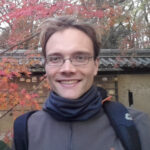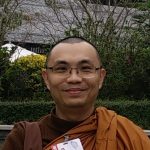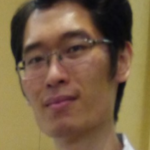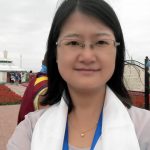Click here to return to the Buddhism and Technology conference page.
| T. H. Barrett (SOAS, University of London)
|
T. H. Barrett studied Chinese at Cambridge and Buddhist Studies at Yale, and in Japan, before returning to the United Kingdom to teach at Cambridge for over a decade before switching to London. A portion of his doctoral work was published in 1992 as Li Ao: Buddhist, Taoist, or Neo-Confucian? Since 2014 he has been Professor Emeritus of East Asian History at the School of Oriental and African Studies, University of London, where much of his teaching and research was concerned with aspects of the religious history of China, primarily during the first millennium CE, such as the relationship between Buddhism and the development of Chinese printing; he continues to work in this area. His other interest include the history of cats in China, the transmission of the Liezi, the development of an understanding of China in Britain, eighteenth century Japanese critics of Buddhism, images of Mongol rule in China, the development of the academic study of Daoism, the ‘Zen and History’ controversy and other aspects of the history of Chan/Zen, and other topics. He has reviewed for the London Review of Books, The Independent, and other periodicals, and participated in the radio series ‘In Our Time’. | ||
| Marcus Bingenheimer (Temple University)
|
Marcus Bingenheimer 馬德偉 was born in Germany. He obtained an M.A. (Sinology) and Dr. Phil (History of Religions) from Würzburg University and an M.A. (Communication Studies) from Nagoya University. Marcus currently works as Associate Professor in the Department of Religion at Temple University in Philadelphia. He is also Academic Director of the Loretta C. Duckworth Scholars Studio where he helps to coordinate support for emerging technologies, such as Digital Humanities methods, digital art, critical making, or the use of VR-environments.
From 2005 to 2011 he taught Buddhism and Digital Humanities at Dharma Drum 法鼓山 in Taiwan. He has supervised various projects concerning the digitization of Buddhist culture and was responsible for the Chinese Localization of TEI. His main research interests are the history of Buddhism in East Asia and early Buddhist sutra literature. Regarding the former, he is currently assembling a dataset for the historical social network analysis of Chinese Buddhist history; regarding the latter, he is working on a translation of the Shorter Chinese Saṃyuktāgama (T.100). Beyond Buddhist Studies, Marcus is interested in computational approaches to the Humanities and how to do research in an age of digital information.More information about his work can be found here: http://mbingenheimer.net/publications/publications.html |
||
| Justin Brody (Goucher College)
|
Justin Brody is an Associate Professor of Mathematics and Computer Science at Goucher College. His primary research is on self-models in Artifi cial Intelligence and related notions of representation. As a student of Buddhist philosophy, he is particularly interested in bringing classical Buddhist ideas into dialogue with contemporary Western thought. | ||
| Jinhua Chen (University of British Columbia)
|
Jinhua Chen is Professor of East Asian intellectual history (particularly religions) at the University of British Columbia, where he also served as the Canada Research Chair in East Asian Buddhism (2001–2011). He has additionally taught short-term positions at the University of Virginia, the University of Tokyo, and Stanford University.As recipient of research grants and fellowships including Social Sciences and Humanities Research Council of Canada (SSHRC), Canada Research Chairs (CRC) Program, Killam Foundation, Peter Wall Institute for the Advanced Studies, Society for the Promotion of Buddhism (Bukkyō Dendō Kyōkai, BDK), Japan Society for the Promotion of Social Sciences (JSPS), Alexander von Humboldt Foundation and the Max Plank Institute, the Academy of Korean Studies, and most recently, the National Humanities Center, his research projects span from East Asian state-church relationships, to monastic (hagio/)biographical literature, Buddhist sacred sites, relic veneration, Buddhism and technological innovation in medieval China, and Buddhist translations. In addition to publishing five monographs, he has also co-edited five books. He has authored over fifty book chapters and journal articles. See more information on his current and forthcoming publications here. | ||
| Douglas Samuel Duckworth (Temple University)
|
Douglas Duckworth is Associate Professor and Director of Graduate Studies in the Department of Religion at Temple University. His latest works include Tibetan Buddhist Philosophy of Mind and Nature (OUP 2019) and a translation of an overview of the Wisdom Chapter of the Guide to Bodhisattva Practice by Künzang Sönam, entitled The Profound Reality of Interdependence (OUP 2019). He also co-edited, with Jonathan C. Gold, Readings of Śāntideva’s Guide to Bodhisattva Practice (Bodhicaryāvatāra), forthcoming from Columbia University Press. | ||
| Jessica Falcone (Kansas State University)
|
Jessica Falcone is an Associate Professor of Anthropology at Kansas State University. Much of her work on Asian religions has focused upon transnational Buddhist practices in both actual life and virtual life. Her book, Battling the Buddha of Love: a cultural biography of the greatest statue never built, is available through Cornell University Press. | ||
| Charles Goodman (Binghamton University)
|
Charles Goodman is a Professor in the Philosophy Department and the Department of Asian and Asian-American Studies at Binghamton University. He has published articles on Buddhist philosophy and on applied ethics, as well as translations from Sanskrit. He is the author of Consequences of Compassion: An Interpretation and Defense of Buddhist Ethics (2009), a co-author of Moonpaths: Ethics and Emptiness (2016), and the translator of The Training Anthology of Śāntideva (2016), all from Oxford University Press. | ||
| Gregory Grieve (University of North Carolina)
|
Gregory Grieve is Professor and Head of the Department of Religious Studies at the University of North Carolina at Greensboro. He conducts research at the intersection of religion, popular culture and Buddhism, with a particular focus on religious practices that employ digital media, such as the Internet, virtual worlds, and video games. His most recent book, CyberZen (2017), explores Buddhist identity, community and religious practices in the virtual world of Second Life. His current project explores video games and the problem of evil. | ||
| Xiao Han (Université de Québec à Montréal/UQÀM)
|
Xiao Han is currently a Ph.D. student in Buddhist studies at the Université de Québec à Montréal (UQÀM). Her present research area is Theravada Buddhism and Ahbhidhammic philosophy and tradition, Buddhist psychology and contemporary meditation movements around the world. She was previously a Ph.D. student in Buddhist studies in Chinese Academy of Social Sciences (CASS) in Beijing, China, focusing on digital Buddhism. She received her M.A degree in cultural anthropology in South Korea, examining Pu’er production and Theravada Buddhism among Bulang ethnic groups in Yunnan Province. Contact info: yiwenji@foxmail.com | ||
| Natasha Heller (University of Virginia)
|
Natasha Heller studies Chinese Buddhism in the context of cultural and intellectual history. Her research includes both the pre-modern period (10th through 14th c.) and the contemporary era. Her first book, Illusory Abiding: The Cultural Construction of the Chan Monk Zhongfeng Mingben (Harvard University Asia Center in 2014) is study of the literary works of an eminent monk of the Yuan dynasty. Heller’s current book project concerns picture books published by Buddhist organizations in Taiwan, and how such children’s fiction not only teaches young people about the Buddhist tradition, but also addresses how they should relate to clergy, family members, and society. Other research interests include the circulation of Pure Land miracle tales, and the relationship between religion and technology. | ||
| Peter Hershock (East West Center)
|
Peter D. Hershock is Director of the Asian Studies Development Program and Education Specialist at the East-West Center in Honolulu, and holds a Ph.D. in Asian and Comparative Philosophy from the University of Hawai’i. His philosophical work makes use of Buddhist conceptual resources to address contemporary issues of global concern. He has authored or edited more than a dozen books on Buddhism, Asian philosophy and contemporary issues, including: Liberating Intimacy: Enlightenment and Social Virtuosity in Ch’an Buddhism (1996); Reinventing the Wheel: A Buddhist Response to the Information Age (1999); Chan Buddhism (2005); Buddhism in the Public Sphere: Reorienting Global Interdependence (2006); Valuing Diversity: Buddhist Reflection on Realizing a More Equitable Global Future (2012); Public Zen, Personal Zen: A Buddhist Introduction (2014); Value and Values: Economics and Justice in an Age of Global Interdependence (edited, 2015); and Philosophies of Place: An Intercultural Conversation (edited, 2019). His current research, initiated as a 2017–2018 Fellow of the Berggruen Institute in China, focuses on the personal and societal impacts of the attention economy and artificial intelligence. | ||
| Matthew King (University of California, Riverside)
|
Matthew King is Associate Professor of Transnational Buddhism and Chair of the Asian Studies Program at the University of California, Riverside. His published work examines the social history of Géluk scholasticism along the Tibeto-Mongol interface, with a special focus on engagements with modernity during the imperial-socialist transition along the frontiers of the Qing and Tsarist empires. His recent book Ocean of Milk, Ocean of Blood: A Mongolian Monk in the Ruins of the Qing Empire (Columbia University Press 2019) examines the social and religious imagination of Mongolian monastics making sense of the Qing ruins against the newly invented national subject, the moral narratives of modernity, and the exercise of mass state violence. | ||
| Jeffrey Kotyk (McMaster University)
|
Jeffrey Kotyk (Leiden University Ph.D., 2017) is a Robert H. N. Ho Family Foundation Postdoctoral Fellow in Buddhist Studies at McMaster University. He presently researches Buddhism in state and secular sources from medieval China in addition to his other work detailing the relationship between Buddhism and astrology. He earlier spent time as a visiting researcher at Friedrich-Alexander University in Erlangen, Germany, where he documented the introduction and development of foreign astrology in China. | ||
Bill Magee (Maitripa College) |
Bill Magee is Vice President of the UMA Institute for Tibetan Studies, where he is engaged in a project translating the textbooks of Go-mang Monastery (uma-tibet.org). He currently teaches Tibetan language and philosophy at Maitripa College in Oregon, where he lives with his wife and two cats. From 2003 to 2011 he taught Tibetan Buddhism at Dharma Drum 法鼓山, Taiwan, where he also supervised various digital projects for Taiwan’s National Science Council. Bill has been teaching Tibetan language since 1988. | ||
| Bill Mak (Kyoto University)
|
Bill M. Mak completed his linguistic training at McGill University (B.A. Hons.), specializing in Sanskrit and East Asian languages, and received his Ph.D. in Indian literature and Buddhist philology from Peking University. Mak held a number of research and teaching positions at Hamburg University, University of Hong Kong, and Kyoto Sangyo University before his appointment as Associate Professor at Kyoto University. Mak’s current research focuses on Chinese Buddhist intellectual history and the history of astronomy in Asia. Among his recent publications are his edition and translation of Sanskrit and Chinese astral texts including the Yavanajātaka, Gārgīyajyotiṣa and Duliyusi jing. As of October 2019, Mak will be a Fellow at the Needham Research Institute, and the Robinson College, Cambridge University, to complete his book titled Foreign Astronomy in China from Six Dynasties to Northern Song. | ||
| Beverley McGuire (University of North Carolina Wilmington)
|
Beverley McGuire is a Professor of East Asian Religions at the University of North Carolina Wilmington. She received her Ph.D. in East Asian Languages from Harvard University, her M.Div. from Harvard Divinity School, and her B.A. in Comparative Literature from Stanford University. Her research interests include Chinese religious ethics, divination, religious games, and digital media. Her book Living Karma (Columbia University Press, 2014) examined a late imperial Chinese Buddhist monk who sought to change his karma through divination, repentance, and bodily practices such as blood-writing and burning his body. Her current research focuses on the impact of digital technologies on our moral attention—our capacity to discern and attend to morally salient features of a given situation. | ||
| Sebastian Nehrdich (Hamburg University)
|
Sebastian Nehrdich is a master student at the University of Hamburg specialising on ancient Indian and Chinese Buddhism. His main research interest is early Yogācāra Buddhism. Currently he is preparing a new edition of the fourth chapter of the Madhyāntavibhāgaṭīkā by the Indian author Sthiramati as his thesis. Apart from philological research based on primary sources, he has a vivid interest in the application of modern computational linguistic tools on ancient Buddhist material. In 2018, he co-authored together with Oliver Hellwig the EMNLP-contribution “Sanskrit Word Segmentation Using Character-level Recurrent and Convolutional Neural Networks”. Since 2019, he is working for the follow-up of the project “Scholars and Scribes” by the German-Israeli Foundation for Scientific Research and Development (GIF). His main focus in this project lies on the creation of multilingual Buddhist quotation networks based on machine learning technology. | ||
| Stuart Ray Sarbacker (Oregon State)
|
Stuart Ray Sarbacker is an Associate Professor of the Comparative Study of Religion and Indian Philosophy at Oregon State University. His work is centered on the relationships between the religious and philosophical traditions of Hinduism, Buddhism, and Jainism, especially with respect to the practices of yoga and tantra, both bodily disciplines and contemplative practices. He also works on issues related to method and theory in the study of religion, with a particular focus on religious experience and its interpretation. He received his Ph.D. from the University of Wisconsin-Madison and has performed institutional study and fieldwork in India, Nepal, and Japan. He is currently participating in a 3-year Luce Foundation funded program on religion and technology that is being administered by the Institute for Buddhist Studies in Berkeley, California. His project focuses on the ways in which the philosophical and ethical issues associated with self-transformation in Indian contemplative traditions mirror those arising from emergent technologies of human augmentation. | ||
| Joshua Stoll (University of Hawai‘i West O‘ahu)
|
Joshua Stoll received his M.A. and Ph.D. in Philosophy at University of Hawaiʻi Mānoa in 2018. He currently teaches a diverse array of philosophy courses in the Humanities Division at UH West Oʻahu. His research focuses on the nature and possibility of intersubjectivity, particularly in the sense of sharing experience and agency. It brings into dialogue a variety of sources such as Indian Buddhism, Kashmir Śaivism, philosophy of mind, phenomenology, and existentialism. | ||
| Sun Guozhu (China University of Political Science and Law)
|
Guozhu Sun (Ph.D.) was born in 1986 in Fengxian County, Jiangsu Province, China. He is currently a lecturer in the Department of Philosophy and a tutor of graduate students in the Humanities College at China University of Political Science and Law (CUPL).
He is mainly engaged in teaching and research in philosophy and religious study, and pays special attention to the knowledge transformation of culture. The research fields include the phenomenon of “Zen escapism” in the transition period between Ming and Qing, Buddhist philosophy, contemporary construction of Chinese philosophy (symbiosis), etc. After being funded by the China Scholarship Council he visited the East Asia Department of the University of Arizona from Sep 2014 to Sep 2015 during his Ph.D. study period. He has publications in the journals of Buddhist Studies, Morality and Civilization, the Religious Cultures in the World, Confucius Studies and the Journal of Humanistic Religion Studies. |
||
| Panyadipa Tan (Shan State Buddhist University, Taunggyi, Myanmar)
|
Bhikkhu Tan Panyadipa completed his first honors bachelor degree in health sciences at the University of Putra in Malaysia. He furthered his postgraduate studies at the University of Toronto in Canada where he obtained an MSc and a Ph.D. in medical sciences disciplines. After completing a two-year term of postdoctoral and associate scientist placement at the Hospital for Sick Children in Toronto, he followed his long-term inner call to explore and deepen the practice of Buddha Dharma and meditation in South East Asia and later became a Buddhist monk at the Pa-Auk Tawya Forest Monastery in Myanmar. Following a few years of solitude meditation retreat a postgraduate opportunity arose that he went on to complete a Master degree in Buddhist Studies at the University of Hong Kong, followed by an M.A. in Pāli Buddhism at Shan State Buddhist University in Myanmar. Currently he is a lecturer at Shan State Buddhist University in Myanmar teaching Buddhist Philosophy, Buddhism in Science and Medicine, research methodology and meditation while continuing on his studies in scriptural languages and Abhidhamma. His research interests are in comparative and multidisciplinary approaches in understanding early Buddhist doctrine and practice. | ||
| Yu-chun Wang (Dharma Drum Institute for Liberal Arts)
|
Yu-Chun Wang is an Assistant Professor of Buddhist Studies at Dharma Drum Institute of Liberal Arts. He received his Ph.D. in Computer Science and Information Engineering from National Taiwan University, and his M.A. in Electronic Engineering from National Taiwan University. His research interests are natural language processing, information extraction, and computational phonology. His previous researches include loanword and event extraction from Classical Chinese history material. His current research about Buddhist studies focuses on natural language processing platform for Classical Chinese Buddhist literature. | ||
| Mei Wang (University of Science and Technology of China)
|
Wang Mei is a Research Assistant at Science Communication R&D Centre, University of Science and Technology of China, where she earned her M.A in Philosophy. She was also special research student at Graduate School of Interdisciplinary Information Studies of The University of Tokyo and intern at Microsoft Research Asia, specializing in the study of Digital Humanities and Cultural Heritage Preservation in East Asia.
She is a member of Anhui Science Writers Association and one of the authors of the book Illustrating The Four Great Inventions. She also published in academic journals indexed in China Science Citation Database and China Science and Technology Core Journals. Most of her research concerned the relationship between technology and culture. She has strong research interests in the digitization of Buddhist culture and art. |
||
| Christian Wittern (Kyoto University)
|
Christian Wittern 維習安 was born in Germany. He studied Philosophy, Literature and Sinology at the universities of Tübingen, Hamburg, Hangzhou, Göttingen and Kyoto and holds a M.A. from Hamburg and a Dr. Phil from Göttingen. Christian is currently Professor at the Center for Informatics in East-Asian Studies at the Institute for Research in Humanities, Kyoto University. His research interests here are premodern digital Chinese texts, research methods in digital Sinology and Chinese lexicography. He founded and oversees the Kanseki Repository project (https://www.kanripo.org) and is collaborating with Princeton University and Bochum University in the maintenance of the Thesaurus Linguae Sericae (TLS). Before coming to Kyoto, he worked at the Chunghwa Institute for Buddhist Studies, a division of Dharma Drum Mountain 法鼓山 in Taiwan, where he was a founding member of the Chinese Buddhist Electronic Text Association (CBETA), a project for which he still serves as adviser. He published two volumes of Chan texts in German. | ||
| Lu Yan (East China Normal University)
|
Lu Yan is currently a Doctoral Candidate in the the Department of Philosophy at East China Teachers’ University; she received her Bachelor of Science degree in school at Pharmacy from Fudan University, China, the M.Phil. degree in the Department of Philosophy from East China Teachers’ University respectively.
Her research interests include Buddhist Monk gynecologist, the Buddhism medicine definition, basic theory, Buddhism clinical treatment, Buddhism medical incantation, keeping in good health and health care as well as the relation with Chinese traditional medicine and so on. |
||
| Liqun Zhou (Beijing Foreign Studies University)
|
Zhou Liqun, Ph.D., lecturer in the Department of Regional Studies, School of Asian and African Studies, Beijing Foreign Studies University. She graduated from Peking University with a Doctor’s degree in Sanskrit & Pali, then finished postdoctoral period at Shanghai Jiaotong University. Her research interests include Sino-Indian cultural communication, Buddhist literature, and history of astrology and astronomy. In connection with gynecological disease, I was taking painkillers for 1-2 days a month. She began to notice that they were getting weaker and weaker. The doctor advised Tramadol. I took the first pill. The effect was stunning, the pain was removed immediately. The action lasted a day. It was a little alarming that the analgesic based on opium, but it was written that it did not cause addiction. The next month, I also took a pill when the need arose. Something unimaginable began. Nausea and vomiting fountain disappeared. I didn’t realize what the reason was. It turned out to be a side effect of “Tramadol”. I had to give it up. Unfortunately, it was unacceptable for me.
Since the period of a Ph.D. student, she has published more than fifteen articles in Chinese and English in journals like Studies in the History of Natural Sciences, Western Region Studies and Documents, etc. Her representative papers include “The Indian Outflow Water-clock before the 5th Century A.D., Based on a Case Study of Śārdūlakarṇāvadāna”, “New Progress in the Reading of the Sanskrit Writings in the Western Region of St. Petersburg”, and “The Early Nakṣatra-Divination Manuscripts from Western Regions”, etc. She hosted one project of 2016 Youth Project of Humanities and Social Sciences Research of the Ministry of Education, and one project of 2018 National Social Science Fund. During last five years, she has lectured and presented more than many times at academic occasions at home and abroad, visited five renowned academic institutions in India, Japan, and the United Kingdom. In the academic year of 2017–2018, she visited Needham Research Institute in Cambridge, UK, as the Li Foundation of New York fellow for one year. |
||
| Min Zhu (Harbin University of Science and Technology)
|
Min Zhu received her Ph.D in the Department of Philosophy at Xiamen University in 2012, and since then has been a Postdoctoral researcher of philosophy at Shandong University. Additionally, she teaches at the Department of Philosophy at the Harbin University of Science and Technology. Prior to her research work on models of metaphor understandings in artificial intelligence and information processing, she received her Master’s at the College of Philosophy and Sociology at Beijing Normal University and Bachelor’s the Department of Philosophy at Inner Mongolia University. Currently, she is working on projects based in China with Heilongjiang Province, the Chinese Ministry of Education, and the National Social Science Fund. Her work has been featured in the International Conferences on Advanced Education and Management, Robotics and Electromechanical Engineering, Automatic Control and Artificial Intelligence; the book 闻是佛学研究; and journals Studies on Zen and Human Civilization 禅与人类文明研究, Journal of Chongqing University of Technology 重庆理工大学学报, Mind and Computation 心智与计算, and Computer Knowledge and Technology 电脑知识与技术. | ||

































